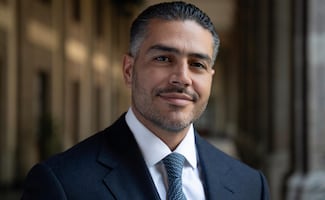Más Información

"Queremos cerrar este capítulo", dice Salinas Pliego al SAT; esperarán a enero a conocer fundamentos legales de adeudo fiscal

New York Times destaca rol de Harfuch en el combate del narco; resalta intercambio de inteligencia con EU

En operativo, cae secuestrador "El Chuleta" en Morelos; detienen a otros 38 generadores de violencia
Mexico City
pledged Wednesday to start mass testing to reach 100,000 tests per month by July , while the federal government appeared to stick by its policy of administering very few tests during the coronavirus pandemic .
Mayor Claudia Sheinbaum
said the capital will embark on a large-scale testing effort to detect and isolate new infections as quickly as possible as the centerpiece of its plan to reopen its economy . Testing will be paired with an intensive information campaign and an attempt at contact tracing.
The sprawling city of 9 million people, with an equal number or more in the suburbs, has confirmed more than 32,000 infections and more than 3,200 deaths , both considered to be undercounted because of limited testing. With 100,000 tests per month, the city could be able to test one in every 14 residents by the end of the year.

While the capital has by far the most cases in Mexico , there are other hot spots. But the administration of President Andrés Manuel López Obrador has refused to apply mass testing , saying it would be a waste of money and effort. Mexico has administered only about 370,000 tests since the pandemic began, in a country of over 125 million . That is about one test for every 335 inhabitants.
Recommended: COVID-19 Live updates: Confirmed coronavirus cases in Mexico
On Wednesday, federal Assistant Health Secretary Hugo López-Gatell lavished praise on the Mexico City plan, calling it “extremely relevant,” “promising” and “one of the most opportune efforts” taken to stem the spread of the coronavirus . But he announced no federal plans to adopt similar measures.
Nationwide, Mexico appears to be stuck on a plateau of relatively high infection and death rates. On Wednesday, the official death toll rose by 708 to 15,357 — one of the highest daily totals yet. The total number of confirmed cases rose by 4,883 to 129,184 . Both are clearly undercounted, experts say.
The federal government has already begun reopening parts of the economy , and López-Gatell had been predicting for weeks that the pandemic in key areas of Mexico had peaked, or would do so in a matter of days.
“The predictions were overtaken ” by waves of cases, López-Gatell said. “There is no declining pattern ... there is a plateau.”
Sheinbaum belongs to López Obrador’s Morena party , and both sides deny there is any kind of split over handling of the pandemic.
Recommended: On pause: Striking photos capture Mexico City under lockdown
The mayor’s plan promises to obtain much more detailed information to track potential infections and their contacts . She also said that small digital meters to measure people’s blood oxygen levels would be distributed to at-risk people and pharmacies. López Obrador’s government has no similar efforts.
The local government plans to run over 2,700 tests per day , that is, 145% more than the current average, for only 1,100 are currently being performed.
The general director of the Digital Agency on Public Innovation Eduardo Clark explained that the necessary supplies are being purchased by the government in order to reach the objective of 100,000 tests per month starting in July.
Sheinbaum also presented five main axes of the program. The first consists of an information campaign at homes to protect everyone from COVID-19 that will involve 5,000 brigades.
The second entails a protocol for early care , a task that will be performed in coordination with the National Institute of Nutrition and UNAM’s School of Medicine , which includes training general physicians and nurses at pharmacies.
Recommended: Mexico is among the 10 countries with the highest COVID-19 death tolls
The third axis involves the modification of the text messages system and its different outlets: detection and safeguard including the early care of cases that could become serious, mainly of those of people with comorbidities .
It will also seek to strengthen medical care via telephone at Locatel and 911 and to timely channel suspected cases to testing at the SEDESA’s 117 centers .
Sheinbaum Pardo stressed that the increase in daily tests is done in coordination with the federal government that includes the IMSS , the ISSSTE , the Navy , the Army , and the CCINSHAE . Moreover, the tests will be analyzed at specific laboratories focused on processing results in order to reduce the waiting time to a maximum of three days.
Recommended: Mexico receives medical supplies from China to fight the COVID-19 pandemic
mp
Noticias según tus intereses
[Publicidad]
[Publicidad]











